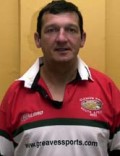|
THE HERALD REPORTS
132 years of general committee rule comes to an end
KEVIN FERRIE, Chief Rugby Writer April 11 2005
The question of who runs Scottish rugby was finally resolved at Murrayfield yesterday when 132 years of general committee rule was overturned with that body replaced by a board of directors.
A Scottish Rugby Board (SRB), comprising executives and non-executive directors will take charge following the annual general meeting in June, while a secondary body, the Scottish Rugby Council (SRC) will, on an advisory basis, represent the various interest groups involved in the sport.
Lasting only slightly more than two hours, what was none the less a momentous meeting agreed the establishment of:
The 12-man SRB will now comprise the chairman and three other non-executive directors, four full-time executives and four SRC members
The 15-man SRC will comprise the SRU president, five league representatives – one each from Premiers One, Two and Three plus two from the National Leagues – five district representatives and representatives from the schools, women's game, referees and the still to be formed Scottish Rugby Players Association
Very much in line with what was envisaged by David Mackay – the former chairman and Phil Anderton, the former chief executive – one of the executives they appointed shortly before being manoeuvred from office reckoned that actually went further than either had dared hope.
"The way the clubs have responded today is exactly the way that Scottish Rugby would have wanted them to respond," said Mike Keohane, the corporate affairs director.
"Now there is a clear way forward with uncompromising governance where a board can create a strategy and deliver it without being second guessed all the time.
"It is one stage further than they [Anderton and Mackay] had hoped for in that the SRB is now the plc. Both would have grabbed this with both hands."
What was agreed at yesterday's special general meeting attended by 166 delegates who were eligible to vote, was also largely in line with the findings of the Working Party on Governance which, following a previous sgm in January, had moved swiftly to outline how the relationship between the SRB and SRC would work.
Crucial to that is that the SRC, which effectively replaces the general committee, can no longer veto executive decisions, something which previously damaged both the speed at which action could be taken while leaving no one group accountable.
The only major change to the working party proposals that was agreed was in the make-up of the SRC, with 90 delegates supporting Boroughmuir's amendment of five league reps and five district reps, one each from Borders, Edinburgh, Glasgow, Midlands and North. The working party had recommended seven from districts and three from leagues.
While the initial motion had, apparently accidentally, overlooked the schools, women, referees and players association when put forward, an amendment that they be included received overwhelming support.
Contrastingly the bid to save the Exiles representation fell by a majority of 94 to 59 – only a handful backed continuance of a second Borders rep – while 86 voted against a proposal that the vice president's office be preserved.
Yet in some ways it was only a first step in reforming a governance structure that had become discredited by the behaviour of some general committee members.
Attention now turns to finding an ambassadorial figure to become president as the SRU makes a new start and, more importantly, to overhauling the out-dated district structure.
The nature of the five district set-up did much to create the type of faction fighting that has contributed to the sport's political problems, with some general committee members more interested in their own patch than the greater good.
There was then, again no need to count the votes in favour of an amendment put forward by Glasgow Hawks and seconded by Lismore that another working party be formed to examine those areas in time for the agm.
Proposing that course of action, Kenny Hamilton of Hawks, who is also secretary of the Premier One Forum, commended it on the basis that it would "keep the process of reform and modernisation moving".
A strong case can now be made for breaking up representation in line with the 14 proposed development areas to be set up around the country.
Immediately after the meeting, though, Gordon Dixon, the president who was out-voted by the rest of the general committee when they passed their vote of no confidence in Mackay in January, admitted a huge weight had been lifted from his shoulders.
"I'm relieved," he said. "The clubs have spoken. We have gone through the previous sgm and the strategic review was approved and now we've dealt with the governance so we can, after all, have harmony by the end of my time as president.
"Today has fulfilled what I'd hoped for, a governance structure that's accepted by all."
Fred McLeod, the former president who was brought in on an emergency basis to replace first Mackay, then Anderton, expressed similar emotions, having worked hard to steer the SRU through the tumultuous aftermath of their departure.
"Somebody had to do it, but the executive management team have been outstanding in their support," he said.
"I suppose I was perceived as a committee plant when I was appointed and I was, but it was the only way it could be done at that stage.
"I didn't expect to be doing these two roles at this stage of my life or be fire-fighting every day, but hopefully we can now get the politicians and sportScotland on side and satisfy them that we have a good governance structure in place."
This article was posted on 11-Apr-2005, 07:12 by Hugh Barrow.
|

KENNY HAMILTON
|









